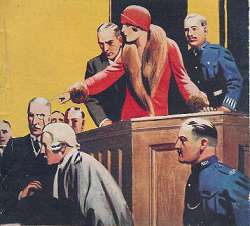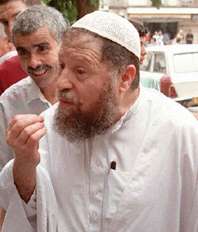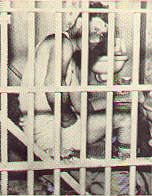Following the referendum on the amnesty for Islamist militants still holding out in the mountains, Hassan Hattab, the former leader of the Groupe Salafiste pour la Prédication et le Combat (GSPC), gave a unique interview to the pan-Arab newspaper al-Hayat (www.daralhayat.com). The information he provides clears up some obscurities in our knowledge of the Algerian jihadist movement, and complements the analysis of the previous edition of Terrorism Focus (see âAlgerian Magazine Rebuts the Amnestyâ).
Hassan Hattab founded the GSPC in 1998. According to his interview, after serving as âemirâ (commander) under Djamel Zitouni in a sector to the east of Algiers for a few years during the 1990s, Hattab formed his breakaway group. The group was formed, he says, due to revulsion at the GIAâs âdeviation from the salafist doctrine to that of al-Takfir wal-Hijra (excommunication and exile),â a doctrine that licensed the âkilling of innocents and denunciation of scholars unjustly,â in particular the denunciation of the leading shaykhs of the Front Islamique du Salut (FIS), Abbasi Madani and Ali Belhadj.
Having served as leader for three years, news began to emerge of Hattabâs resignation from the GSPC in 2001 over ideological differences. During the interview, Hattab referred to the increasing influence of bin Laden over the movement at that time as causing rifts in the membership, and one of the factors behind his own decision to leave (these rifts were likely behind the confusion surrounding the GSPCâs support, or criticism, of bin Laden at the time of the 9/11 attacks). In general, Hattab emphasized bin Ladenâs influence on strategy, such as the decision to inaugurate activity in the African sahel, and post-dated his involvement with the group. âWhat had made things worse,â Hattab claims, âwas that I had decided to place limits on the [form the] struggle [should take].â Disappearing subsequently from the scene, in summer 2003, reports from mujahideen âpenitentsâ began to emerge saying that he had been killed in confrontations either with the Mali military or with members of the GSPC, who by August of that year had officially appointed Nabil Sahraoui as its new leader.
In the interview Hattab explains his disappearance as a deliberate decision âto organize my affairs to facilitate activity and communicate with the brothers in the mountains.â He maintains that far from difficulties with former colleagues, he was ânot confronted with anything unpleasant, and was able to circulate among them.â The point Hattab appears to be making here is one of continuity in his role in contradistinction to the lack of continuity demonstrated by the present leadership. This conflict came out into the open at the beginning of this year when, following a trenchant criticism of the group by leading militant strategist Abu Musâab al-Suri, the current GSPC leader Abu Musâab Abd al-Wadoud posted a fatwa on February 9 on the GSPC website [www.jihad-algeria.com] against Hattab and his âprostration to the tyrantsâ (see Terrorism Focus, Volume II, issues 7 and 20). Hattab responded on February 17 via the Algerian Arabic daily El-Khabar, accusing Abd al-Wadoud of policies reminiscent of former GIA leaders Djamel Zitouni and Antar Zouabri [www.elkhabar.com]. The accusation Hattab made at the time, of GIA infiltration into the GSPC, he expanded in the al-Hayat interview, arguing the domination of infamous GIA group figures âwho carry the ideas of the GIA, using taqiyya [dissimulation] due to their numerical inferiority.â
Despite the February 9 declaration, Hattab maintains that he is still the official leader of the GSPC: âI consider myself its founder and leader, since the leadership is conferred as a duty⊠the brothers have entrusted me this task.â As for the resignation reports, Hattab maintains, despite the August 2003 declaration by Nabil Sahraoui, that âthe GSPC has no document or audio tape to confirm it.â
Since his 2001 withdrawal from the GSPC, Hattab has been gaining a progressively higher profile as a campaigner for an end to the armed struggle. In the interview he openly admits communicating with Algiers and to exchanging mutual aid in ensuring the success of the amnesty project initiated by President Abdelaziz Bouteflika. He justifies his position by referring to âguaranteesâ received from Algiers, and to optimistic âdevelopments in the authoritiesâ treatment of elements of the Islamist armed groups.â Although at the time of the September 29 referendum on the proposal the number of recorded âpenitentsâ hardly topped two dozen, Hattab maintained that Bouteflikaâs initiative âactually has wide support among the activists in the mountains.â As to the threats voiced by Abd al-Wadoud against members taking up the offer, Hattab remains unfazed: âGSPC does not have the means to liquidate the overwhelming majority who are convinced of the initiative.â The delay, he maintains, is due simply to some reservations on details of the proposal, notably the rejection of âthe accusation of terrorism to the brothers who took up arms against the revolution,â and objections to âthe removal of the FIS from the political arena.â
The interviewer, Muhammad Muqaddam, spoke of Hattabâs judicious caution in his responses, in order to avoid any mistakes at a delicate stage in what he termed âhistoricâ negotiations. This may account for Hattabâs carefully sketched chronology on his ownâand bin Ladenâsâmutually exclusive involvement in the GSPC, as an attempt to present a âclean recordâ vis-à -vis the war on terror. It may also account for an interesting omission, namely his earlier accusations of GIA infiltration by the Algerian secret services. His role as catalyst for the surrender of Algerian militants leaves Hattab highly exposed, but up in the hills near Tizi Ouzou from where he is co-ordinating his work, there is no more talk of the âmilitancy option,â which he retained even up to a year ago. Meanwhile, Abd al-Wadoud maintains his irredentist struggle up in the mountains of the Akfadou region of Bejaïa province ânot for the restoration of their economic circumstances [under the amnesty], nor for the restoration of social rights or confiscated political gains, nor to return to the year 1991 [before the suspension of the election results that sparked the civil war], but for a return to the first three centuries, for nothing less than the [establishment of] the Caliphate.â |
 ...an emirate on the east coast of the Arabian Peninsula. It sits on some really productive gas and oil deposits, which produces the highest per capita income in the world. They piss it all away on religion, financing the Moslem Brotherhood and several al-Qaeda affiliates. Home of nutbag holy manYusuf al-Qaradawi...
...an emirate on the east coast of the Arabian Peninsula. It sits on some really productive gas and oil deposits, which produces the highest per capita income in the world. They piss it all away on religion, financing the Moslem Brotherhood and several al-Qaeda affiliates. Home of nutbag holy manYusuf al-Qaradawi...
 [Ennahar] The former number two of the Islamic Front of Salvation (FIS, dissolved)
[Ennahar] The former number two of the Islamic Front of Salvation (FIS, dissolved)  [Ennahar] Algerian Islamists have tried unsuccessfully to be added to the new revolt that has shaken Algeria since 5 January, when they had reached the peak of their popularity after the deadly riots of October 1988.
[Ennahar] Algerian Islamists have tried unsuccessfully to be added to the new revolt that has shaken Algeria since 5 January, when they had reached the peak of their popularity after the deadly riots of October 1988. [Maghrebia] In response to a request by Algeria, the UN on Monday (July 27th) suspended the consultative status of the Paris-based
[Maghrebia] In response to a request by Algeria, the UN on Monday (July 27th) suspended the consultative status of the Paris-based  Fewer than 100 Islamist rebels have surrendered under an Algerian amnesty and at least 700 remain at large fighting for a purist Islamic state, the interior minister said on Saturday.
Fewer than 100 Islamist rebels have surrendered under an Algerian amnesty and at least 700 remain at large fighting for a purist Islamic state, the interior minister said on Saturday. Algeria on Monday released a leader of a banned Islamic party.
Algeria on Monday released a leader of a banned Islamic party.  called on Bouteflika to declare a comprehensive amnesty and "free prisoners, chiefly the honorable
called on Bouteflika to declare a comprehensive amnesty and "free prisoners, chiefly the honorable  An Algerian political leader has been told by a court that he would remain imprisoned pending further questioning, his son said.
An Algerian political leader has been told by a court that he would remain imprisoned pending further questioning, his son said.